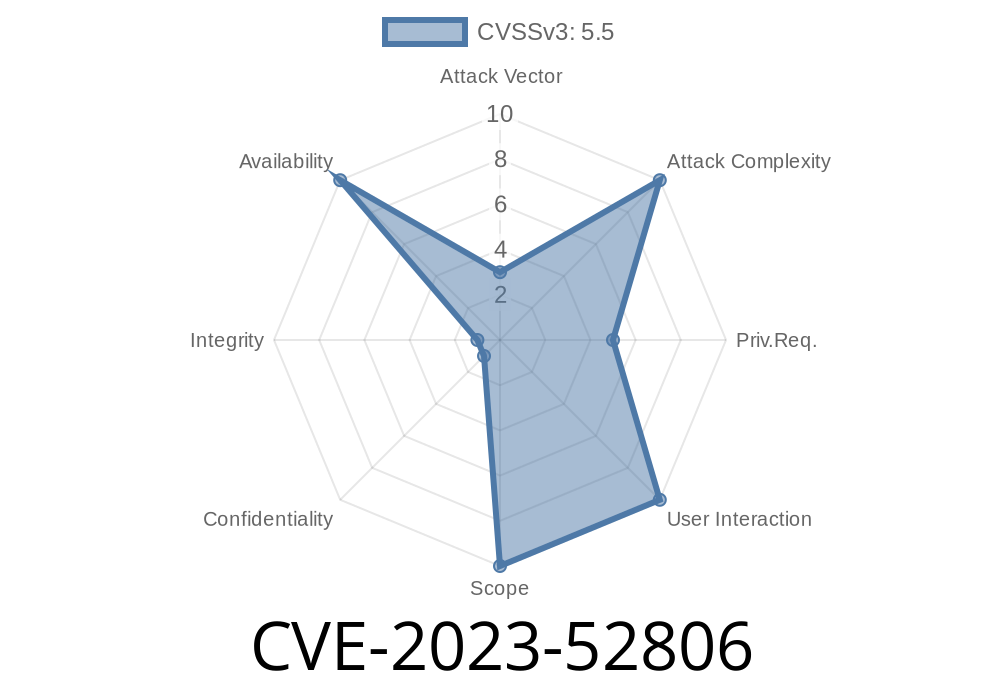In December 2023, a serious vulnerability was fixed in the Linux kernel’s Advanced Linux Sound Architecture (ALSA) subsystem, specifically affecting the ‘hda’ (High Definition Audio) driver. Tracked as CVE-2023-52806, this issue could allow a local user to trigger a kernel crash through a null pointer dereference, leading to a denial of service (DoS). In this article, we’ll explain the bug in simple terms, show relevant code snippets, and walk through how an attacker could exploit this issue.
What’s The Problem?
The ALSA subsystem in Linux powers audio support for many systems. The ‘hda’ part manages high-definition audio hardware using *streams*. Each stream can be one of several types: HOST, LINK, or COUPLED.
Audio DSP (Digital Signal Processor) drivers are only supposed to use streams of type HOST or LINK. But, before this fix, there was nothing stopping a user from trying to assign a COUPLED stream. Here’s where things go wrong:
- The kernel code doesn’t check if the supplied substream pointer is actually valid when assigning a COUPLED stream.
- If the substream is a stub (essentially empty, like during code-loading), and someone tries to assign it, the kernel will try to use a pointer that isn’t set up — boom, null pointer dereference.
How Serious Is It?
This is a local DoS vulnerability. It doesn’t allow privilege escalation or data theft, but a user or program running on your system could make your computer freeze or crash.
The Fix
The bug was patched by adding a check to ensure the substream pointer is valid before trying to use it. If the stream is of COUPLED type, it rejects the assignment early.
Here’s a snippet from the accepted patch in the kernel sources
// in sound/pci/hda/hda_controller.c
if (azx_dev->core.stream_type == SNDRV_PCM_STREAM_COUPLED) {
/* Now bails out early if substream is missing */
if (!substream)
return -EINVAL;
}
Now, before assigning a COUPLED stream, the code checks if the substream pointer is actually set. If not, it returns an error code (-EINVAL), preventing the null pointer from being dereferenced.
Patch reference:
https://git.kernel.org/pub/scm/linux/kernel/git/torvalds/linux.git/commit/?id=a3a9d3df42f1e3b3d358e1cbc6115e9ae863d9b6
It’s a little technical, but, essentially, an attacker would
1. Open a connection to the ALSA ‘hda’ audio device (e.g., through /dev/snd/).
While you likely won’t find an off-the-shelf exploit, a researcher might script something like
#include <alsa/asoundlib.h>
int main() {
snd_pcm_t *handle;
snd_pcm_open(&handle, "hw:,", SND_PCM_STREAM_PLAYBACK, );
// Faking a COUPLED stream assignment (this part requires deep ALSA knowledge and may need custom kernel interaction)
// ...
// The buggy code would dereference a NULL substream pointer here
return ;
}
> *Disclaimer: This is a conceptual illustration. Writing a real-world exploit would require directly invoking kernel APIs, often from a custom kernel module or through crafted userland actions.*
What Should You Do?
- Check your kernel version. Most distributions patched this vulnerability in late December 2023 or January 2024.
- If you’re using a 6.6.x or newer kernel, or if your distribution has backported the patch, you’re safe.
- Update your system: Always keep your kernel and packages up-to-date, especially on multi-user servers.
- Lockdown access: Limit untrusted users’ access to sound hardware, especially on shared or sensitive systems.
Upstream Kernel Commit:
CVE Entry:
https://cve.mitre.org/cgi-bin/cvename.cgi?name=CVE-2023-52806
Linux ALSA project:
Summary Table
|-----|------------------|
| CVE | CVE-2023-52806 |
| Impact | Local Denial of Service (kernel crash) |
| Component | ALSA HDA (sound/pci/hda/hda_controller.c) |
| Patched | Dec 2023 (Linux kernel 6.6+) |
| Exploitability | Local, any user |
In Simple Terms
If your Linux system allows other users to play with audio devices and you haven’t updated recently, someone could make your computer crash on purpose. Gladly, now it’s fixed — so keep your system patched!
> *Stay secure: Bugs like these remind us that even “small” device drivers need careful checks. Sound matters — for security, too!*
Timeline
Published on: 05/21/2024 16:15:18 UTC
Last modified on: 05/24/2024 01:14:20 UTC
